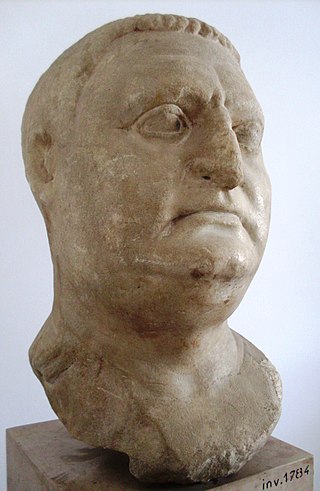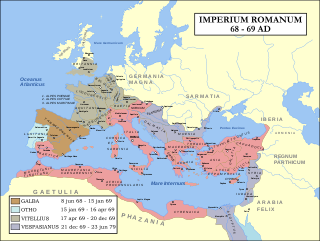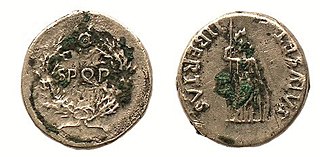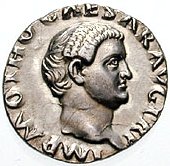
Galba was Roman emperor, ruling from AD 68 to 69. He was the first emperor in the Year of the Four Emperors and assumed the throne following Emperor Nero's suicide.

Otho was Roman emperor, ruling for three months from 15 January to 16 April 69. He was the second emperor of the Year of the Four Emperors.

Aulus Vitellius was Roman emperor for eight months, from 19 April to 20 December AD 69. Vitellius became emperor following the quick succession of the previous emperors Galba and Otho, in a year of civil war known as the Year of the Four Emperors. Vitellius added the honorific Germanicus to his name instead of Caesar upon his accession. Like his predecessor, Otho, Vitellius attempted to rally public support to his cause by honoring and imitating Nero who remained popular in the empire.

AD 69 (LXIX) was a common year starting on Sunday of the Julian calendar. In the Roman Empire, it was known as the Year of the consulship of Galba and Vinius. The denomination AD 69 for this year has been used since the early medieval period, when the Anno Domini calendar era became the prevalent method in Europe for naming years.

Gaius Julius Vindex, was a Roman governor in the province of Gallia Lugdunensis. He was of a noble Gallic family of Aquitania and was one of the men belonging to a faction of Empress Agrippina, the mother of Nero. Vindex had taken part in a conspiracy against the emperor in 59.

The Revolt of the Batavi took place in the Roman province of Germania Inferior between AD 69 and 70. It was an uprising against the Roman Empire started by the Batavi, a small but militarily powerful Germanic tribe that inhabited Batavia, on the delta of the river Rhine. They were soon joined by the Celtic tribes from Gallia Belgica and some Germanic tribes.

The Year of the Four Emperors, AD 69, was the first civil war of the Roman Empire, during which four emperors ruled in succession: Galba, Otho, Vitellius, and Vespasian. It is considered an important interval, marking the transition from the Julio-Claudians, the first imperial dynasty, to the Flavian dynasty. The period witnessed several rebellions and claimants, with shifting allegiances and widespread turmoil in Rome and the provinces.
Aulus Caecina Alienus was a Roman general active during the Year of the Four Emperors.
Gaius Licinius Mucianus was a Roman general, statesman and writer. He is considered to have played a role behind the scenes in the elevation of Vespasian to the throne.
The Battle of Bedriacum refers to two battles fought during the Year of the Four Emperors near the village of Bedriacum, about 35 kilometers (22 mi) from the town of Cremona in northern Italy. The fighting in fact took place between Bedriacum and Cremona, and the battles are sometimes called "First Cremona" and "Second Cremona".
Lucius Calpurnius Piso Frugi Licinianus (38–69) was a Roman nobleman who lived in the 1st century. His adoption by the Roman emperor Galba on 10 January 69 AD precipitated their joint murder by Otho, who had expected to be adopted instead. Otho then became the second emperor of the Year of the Four Emperors.
Titus Flavius T. f. T. n. Sabinus was a Roman politician and soldier. A native of Reate, he was the elder son of Titus Flavius Sabinus and Vespasia Polla, and brother of the Emperor Vespasian.
Titus Flavius Sabinus was a Roman senator who was active in the first century AD. He was twice consul suffectus, first in the nundinium of April through June of 69 with his brother Gnaeus Arulenus Caelius Sabinus, and again in May and June of 72 as the colleague of Gaius Licinius Mucianus.
Marcus Cluvius Rufus was a Roman consul, senator, governor, and historian who was mentioned on several occasions by Tacitus, Suetonius, Cassius Dio, Josephus and Plutarch.
Locus Castorum was an ancient village of the Roman Empire era located in northern Italy approximately 12 miles (19 km) from Cremona, and midway between Cremona and Bedriacum. Its name derives from the Gemini twins, of Castor and Pollux. It was the site of the Battle of Locus Castorum.
The gens Vitellia was a family of ancient Rome, which rose from obscurity in imperial times, and briefly held the Empire itself in AD 69. The first of this gens to obtain the consulship was Aulus Vitellius, uncle of the emperor Vitellius, in AD 32.
Fabius Valens of Anagnia was a Roman commander favoured by Nero. Valens was an undisciplined character but not without talent; he tried to portray himself as witty by behaving frivolously.
Publius Galerius Trachalus was a Roman senator, who was active during the middle of the first century AD. He was consul for the year 68 as the colleague of Silius Italicus and a noted Roman orator praised by Quintilian.
Aulus Marius Celsus was a Roman senator who held several offices in the emperor's service during the first century AD, as well as playing a role in the Year of Four Emperors. He was suffect consul of the nundinium of July to August 69 as the colleague of Gnaeus Arrius Antoninus.
Appius Annius Gallus was a Roman senator and general who flourished during the first century. He held the office of suffect consul in 67 with Lucius Verulanus Severus as his colleague. The suffect consul of 67 is commonly identified as the general who supported Otho during the Year of the Four Emperors.







